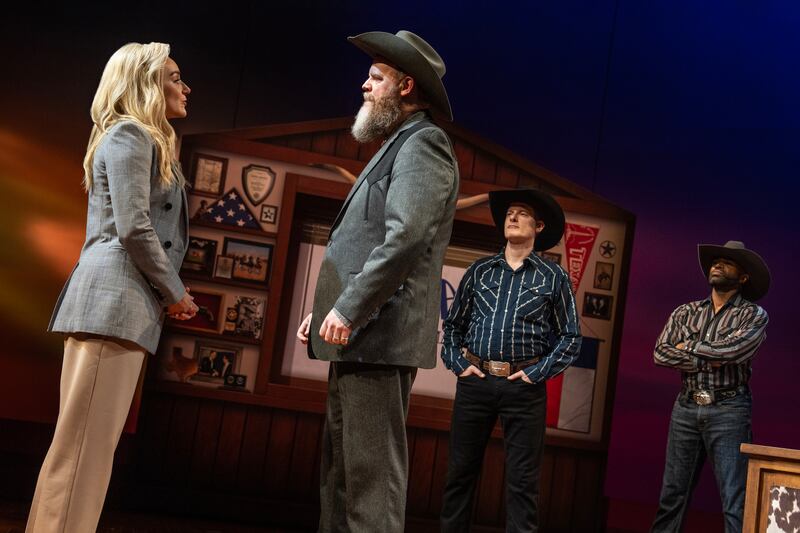Whether you love Joy: A New True Musical as much as its producers desire depends on two things: your devotion to mops (talk about mops, songs about mops—just mops, mops, mops), alongside an unquestioning appreciation of simply-told success stories.
The tale of how Miracle Mop founder Joy Mangano (Betsy Wolfe) made her fortune, the musical—playing at the Laura Pels Theatre at the Harold and Miriam Steinberg Theatre (to Aug. 17)—is the stage version of a life story already well established in pop culture; a 2015 movie version starring Jennifer Lawrence earned the actor an Oscar nomination. Two years later, Mangano published her autobiography, Inventing Joy.
There is nothing wrong with the predominant vibe of the stage show, directed by Lorin Latarro—a relentless “you-go-girl” cheerleading, with Joy asserting herself against an array of negating forces, from obstructive family to misogynistic male saboteurs within the business world—but the repetition of the theme in Ken Davenport’s book and AnnMarie Milazzo’s songs becomes grating, no matter the wonderful Wolfe’s efforts to add texture and (phenomenal) voice to the on-page flatness of her character. (Tony-nominated for her role as Shakespeare’s wife Anne Hathaway in & Juliet in 2023, Wolfe, who has also starred in Falsettos and Waitress, is a consistently impressive reader and elevator of her characters.)
So much in this middling show feels unspecific and under-examined. Each significant struggle, professional and personal, unfolds with a “Can Joy make it? You bet she can!” arc, beginning with clearing up the messes of her family home—with sofa-bound, critical mom, no-good-not-terrible ex-husband, well-meaning but flawed dad, and teen daughter who whines Joy never has any time for her. All of these figures initially play as entitled leeches, and Joy the careworn servicer-in-chief of all their needs.

But we know Joy is so much more than a domestic-crisis solver. She’s an inventor; we hear that she’s been conceiving strange and wonderful creations right from when she was a little girl. The Miracle Mop is the lucrative payoff to a lifetime’s imagining.
The story’s feminism is not just that Joy is a woman who succeeds, and a housewife and mom who conquers the business world, but that her invention was dreamt up thinking of the time and practicality challenges facing other women (in the show, a chorus of symbolic everyday women).
The story stretches to a bafflingly related story about some dreadful Texas-based sexist creeps who have somehow filched a mop patent, all leading to a court case with what the musical wants to be Joy’s searing 11 o’clock number of ultimate self-assertion and strength in adversity. The brilliant Wolfe sells and sings it with ringing sincerity, but she’s already sung a whole brace of preceding songs, or faced a series of plot knots, with the same theme.
The question in my mind was: What did Joy or her legal representatives actually say and do in this courtroom to win the case. Was the judge convinced by an unsung declaration of female strength and empowerment as the song suggests, or was it something more legal and specific?
The same what-really-happened-here? question hangs over the family conflicts which are resolved by each family member realizing how deficient they are, and how brilliant Joy is, with Joy in each case sweetly shrugging and loving them regardless. At QVC, it’s the same: Can she beat the men in suits; can she sell, sell, sell, and be herself? What do you think? (Unfortunately for the show, and in a case of the devil having the best tunes, the flashiest numbers are by men, as the QVC-suits and awful Texans.)

Then there are the mops. OK, the mops are surely the heart of her success—Mangano is an extremely rich businesswoman—but on stage as a prop and central motif they do not clean up. Sure, we can see they have a unique self-draining/wringing mechanism, but every bit of muck chucked on the ground to demonstrate their supposed efficacy gloopily messes each mop up. They look gross. You can supposedly wash them, but the musical doesn’t have time for that, and so under the lights the mops end up looking more yucky than revolutionary and magical.
An Oprah-like moment of “You get a mop, and you get a mop” unfolds with several audience members going home with them in a mass handout that underscores the far-from-ironic message of the show: Buy Mangano’s stuff.
There are parts of the show, mostly thanks to Wolfe, that spike some of its capitalist fervor, such as when she plays Mangano as comically frozen in front of the QVC cameras for the first time, then suddenly assured as she speaks plainly from the heart. But the QVC logo behind her, and all the songs about the mops and everything else on sale, are delirious hymns to commerce. If it’s meant to be satirical, it feels more like being trapped at a shopping expo.

Perhaps Mangano did as the musical says. Perhaps every time she faced opposition or setbacks, she had a speech ready about being determined and steadfast and not giving up. But that can’t be her whole story. There had to have been steel, guile, hard-knuckle, white-knuckle moments that didn’t resolve so easily and so predictably.
Watching a life story made so simple and simpering made me wonder about Mangano’s real story of success against the odds, and a different musical that would ask deeper questions about its lead character—a chewier and more interrogating story of a rollercoaster life. But Joy isn’t that show. Like one of the Mangano’s mops, it executes a far simpler clean-up operation, its messes quickly gone, its surfaces neat and clean, and only a desire to sell left front and center.









